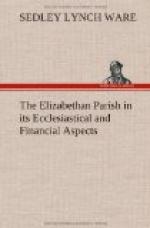If a man for want of friends, or for want of good reputation, were unable to procure compurgators to attend him at visitations or courts, held sometimes twenty miles and more away,[187] he might be condemned as guilty of specific acts which he had never committed.[188] He might even fail in his proof because he was poor. When the judge arraigned Lewis Billings of Barking, Essex archdeaconry, for “that he hath failed in his purgacion,” Billings pleaded “that he is a very poore man and not able to procure his neighbours to come to the cort, and beare their charges."[189] But, as is well known, contemporaries attacked not only the inferior officers, but the judges themselves. Complaints of great abuses were loud and long,[190] and when the ecclesiastical courts were abolished by the Long Parliament in 1641,[191] the satirical literature of the day celebrated their downfall with a verve, a gusto, and an exultation amazing to one not familiar with the procedure of these courts.[192]
As was mentioned at the beginning of this chapter, the secular judges were given statutory authority to take cognizance of breaches of the order prescribed by the Book of Common Prayer, of the offence of not attending church, and other delinquencies against the legal settlement of religion. Hence in these matters they exercised what might be called a sort of ecclesiastical jurisdiction in aid of the ordinary and concurrently with him, though their mode of procedure, of course, was that of the common law, possessing nothing in common with the practice adopted in courts Christian. Men who were “hinderers” and “contemners” of religion; who refrained from going to church without lawful cause; who had mass-books or super-altars[193] in their possession;[194] who spoke in contempt of the Book of Common Prayer and its rites;[195] who caused their children to be baptized with forms other than those prescribed;[196] ministers who omitted the cross in baptism;[197] who left off the surplice;[198] who refused to church women;[199] who called purification “a Jewish ceremony,” or who in their sermons preached seditious doctrine[200]—all these and other like offenders were indicted at quarter sessions or at the assizes.
CHAPTER II.
PARISH FINANCE.
Speaking generally of the average parish, Elizabethan churchwardens accounts and vestry minutes show that for the purposes of raising money amongst themselves to meet every-day parish expenditures,[201] the parishioners of the period did not commonly resort to rates, if by “rate” be understood a general assessment of all lands or all goods alike at a fixed percentage of their revenue or value above a minimum exempted.




